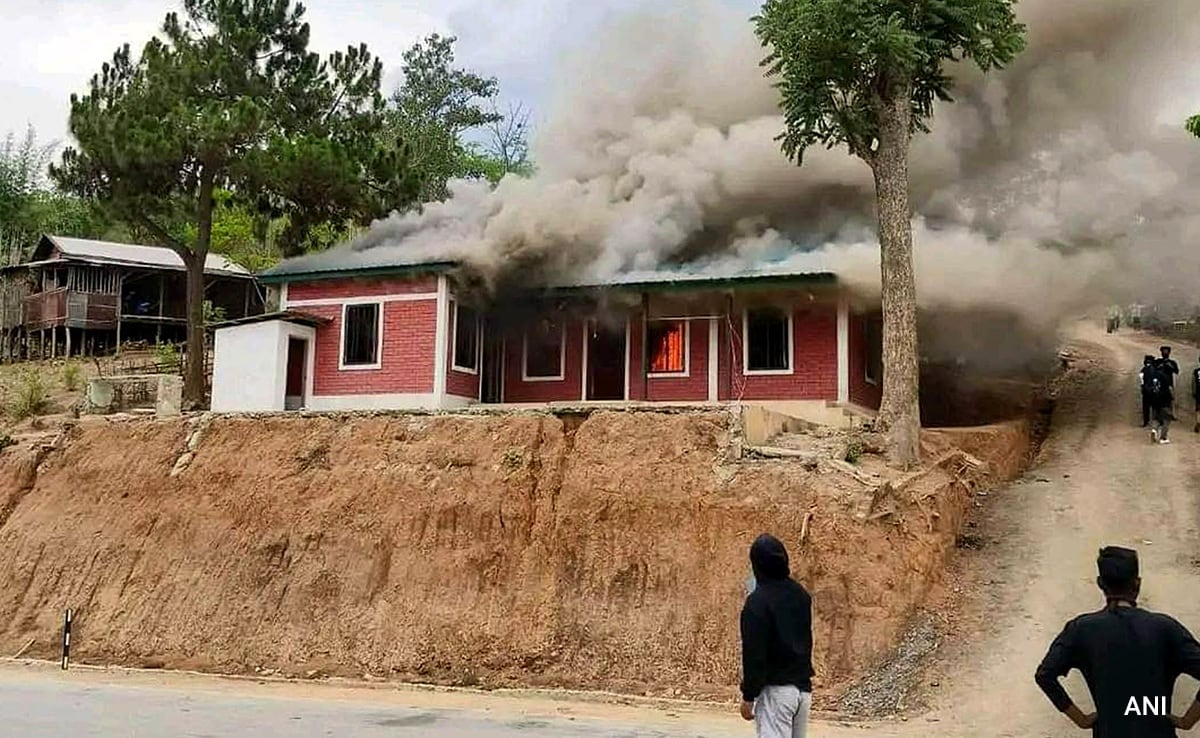
Ethnic violence in Manipur broke out on May 3 (File)
New Delhi:
A panel discussion organised in Geneva by an evangelical alliance on the Manipur violence has been widely condemned on social media over alleged “interference” in India’s internal matters.
The World Evangelical Alliance (WEA) hosted the event on the sidelines of the 54th session of the UN Human Rights Council on Tuesday. Wissam al-Saliby, the director of WEA’s Geneva office, moderated the discussion titled “The crisis in Manipur and implications for human rights in India.”
A massive controversy broke out after the evangelical alliance’s officer in his closing remarks said the Indian government should work towards turning the country “into a more democratic, inclusive society and community,” a comment that was seen as throwing a shade at India.
Lieutenant General L Nishikanta Singh (retired), who has been closely monitoring the Manipur situation, posted on X (formerly Twitter) that the “break India gang is at it again”.
“Break India gang is at it again. Exploiting Manipur’s communal fault line, taken it to so-called UN expert panel to help migrants, who also approached Germany, besides the US, Israel, UN, EU, etc for a separate country. All Indians must condemn interference in our internal affairs,” Lt General Singh posted on X.
‘Break-India Gang’ is at it again. Exploiting Manipur communal fault line, taken it up to so called ‘UN Expert’ panel, to help migrants, who approached Germany, besides US, Isreal, UN, EU etc for a separate country. All Indians must condemn interference in our internal affairs.
— Lt Gen L Nishikanta Singh (R) (@VeteranLNSingh) September 20, 2023
“See the composition of the so-called expert panel. The unfortunate ethnic violence in Manipur is being politicised on the global stage to defame India,” the army officer who retired after 40 years of service – including in the Intelligence Corps – told NDTV on phone.
The other members of the Geneva panel who spoke on the Manipur ethnic violence between the hill-majority Chin-Kuki-Zo tribes and the valley-majority Meiteis are Reem Alsalem, UN special rapporteur on violence against women and girls; Florence N Lowe, head of North American Manipur Tribal Association; Henna Zuberi, advocacy director of Justice for All, and Nury Turkel, commissioner of the US Commission on International Religious Freedom, who sent a pre-recorded video message.
The World Evangelical Alliance said Manipur has been seeing large-scale violence “primarily against the tribal Christian Zo people (Kuki, Zomi, Hmar tribes) that led to at least 180 deaths, rampant sexual violence, and hundreds of churches and thousands of homes that were demolished or burned down.”

Khuraijam Athouba, the spokesperson of the Core Committee (COCOMI), an umbrella body of Meitei civil society groups, got three minutes to speak towards the end of the panel discussion. He alleged the discussion was “one-sided” and propagated the views of only one community.
“This is a forum of the United Nations, so everyone has a right to know the facts and truth to address what is happening in Manipur… When we talk about Hindu majority, we Meiteis in Manipur are not the majority… We represent around 8.5 lakh of the (state’s) population. And the Christians in Manipur are around 12 lakh. They comprise more than 53-54 per cent,” Mr Athouba said, before he was interrupted by the moderator, who asked him to make haste.
“But we need to clarify the facts,” Mr Athouba responded.
“If you are narrating it in the wrong context, we need to check it out. Or shall we go with the wrong facts and continue this debate and discussion? What’s your intention then, we need to check it out? The religion card was never an issue in the Manipur violence because the Meiteis never targetted Christians. There is also a huge population of Meitei Christians… They (panelists) missed informing that Meitei churches have been completely vandalised and razed in Kuki-dominated areas in Churachandpur right on the first day (of the violence) before violence broke out in Imphal,” Mr Athouba said.
Mr al-Saliby of the World Evangelical Alliance, who moderated the discussion, then insisted that the session has to end and offered to speak to the COCOMI spokesperson after the event.
“But allow me to speak. Let the audience know. Why are we completely neglecting the issue of narcoterrorism? The UNODC has already reported Churachandpur has become the hub of the new Golden Triangle… It is a completely one-sided discussion. It should be neutral,” Mr Athouba said, referring to a report by the United Nations Office on Drugs and Crime. The “Golden Triangle” refers to the tri-junction of the Myanmar, Laos and Thailand borders, which used to be the preferred route of drug traffickers.
Mr al-Saliby strongly denied it was a one-sided discussion. “We are not a one-sided discussion. There is a lot we can provide after the discussion,” he said.
“Then you should have the patience to listen to me,” Mr Athouba shot back.
The ethnic violence in Manipur broke out in Churachandpur district on May 3 amid a protest by the Kuki tribes over the Meiteis’ demand for inclusion under the Scheduled Tribes (ST) category. Thousands from both communities have been internally displaced and nearly 200 killed.
The security forces have set up safe zones between Meitei- and Kuki-dominated areas to prevent escalation of violence.




